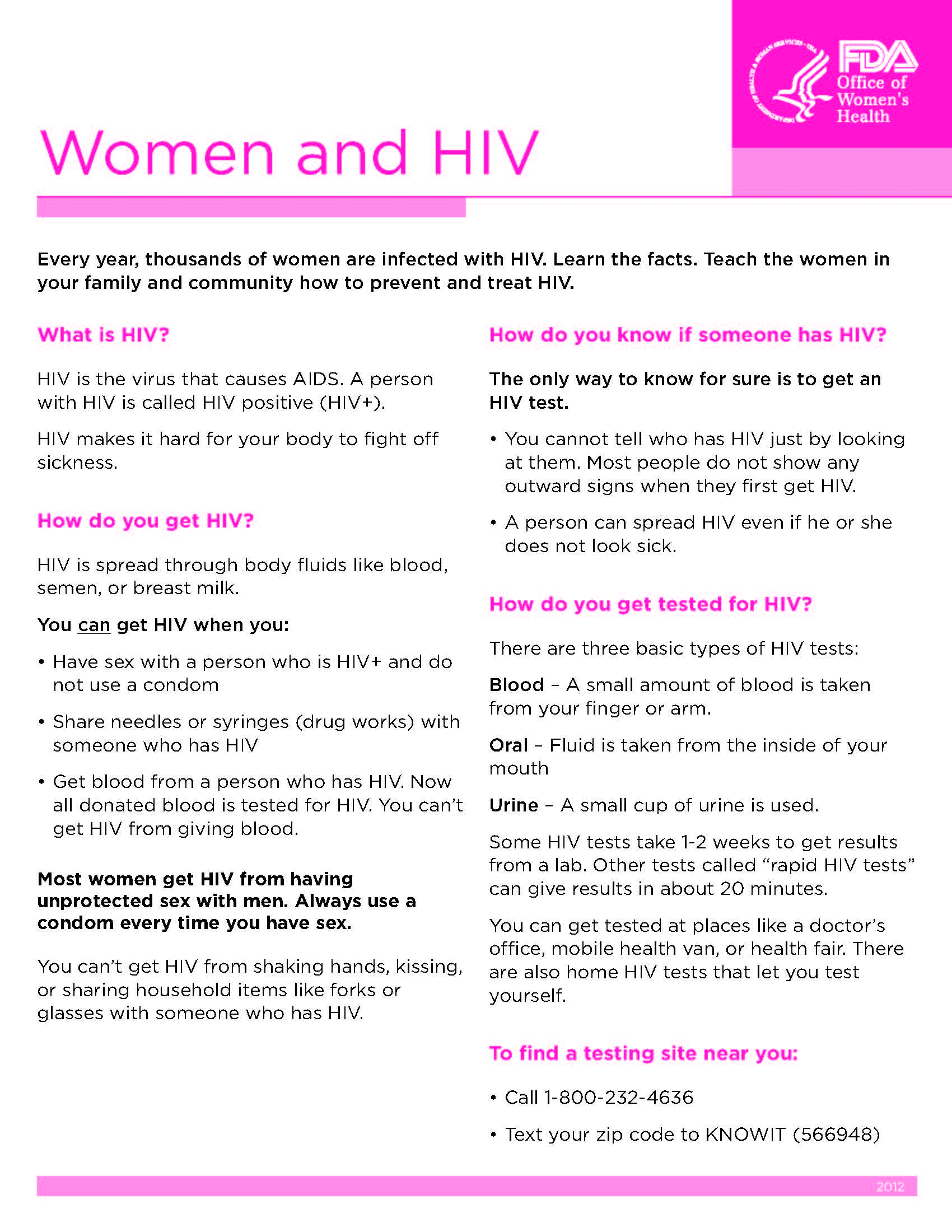Every year, thousands of women are infected with HIV. Learn the facts. Teach the women in your family and community how to prevent and treat HIV.
What is HIV?
HIV is the virus that causes AIDS. A person with HIV is called HIV positive (HIV+).
HIV makes it hard for your body to fight off sickness.
How do you get HIV?
HIV is spread through body fluids like blood, semen, or breast milk.
You can get HIV when you:
- Have sex with a person who is HIV+ and do not use a condom
- Share needles or syringes (drug works) with someone who has HIV
- Get blood from a person who has HIV. Now all donated blood is tested for HIV. You can’t get HIV from giving blood.
Most women get HIV from having unprotected sex with men. Always use a condom every time you have sex.
You can’t get HIV from shaking hands, kissing, or sharing household items like forks or glasses with someone who has HIV.
How do you know if someone has HIV?
The only way to know for sure is to get an HIV test.
- You cannot tell who has HIV just by looking at them.Most people do not show any outward signs when they first get HIV.
- A person can spread HIV even if he or she does not look sick.
How do you get tested for HIV?
There are three basic types of HIV tests:
- Blood – A small amount of blood is taken from your finger or arm.
- Oral – Fluid is taken from the inside of your mouth
- Urine – A small cup of urine is used.
Some HIV tests take 1-2 weeks to get results from a lab. Other tests called “rapid HIV tests” can give results in about 20 minutes.
You can get tested at places like a doctor’s office, mobile health van, or health fair. There are also home HIV tests that let you test yourself.
To find a testing site near you:
- Call 1-800-232-4636
- Text your zip code to KNOWIT (566948)
What is the “window period”?
It may take a few weeks or months for HIV to show up on a test. This time is called the “window period”.
- A person who was just infected with HIV may not test positive even though they have the virus.
- A person can give the virus to others during the window period.
Is there a cure for HIV?
There is no cure for HIV. There are medicines that people with HIV can take ( http://www.fda.gov/ForConsumers/ByAudience/ForWomen/ucm118597.htm ) to help stop the virus from building up in their body.
- People with HIV may need to take 3 or more drugs every day.
- Over time, you can get very sick if you do not take your HIV medicines.
- People with HIV should not stop taking their medicines without first talking to a doctor.
FDA has also approved one medicine that some people can take to lower their chance of getting HIV.
What should pregnant women know about HIV?
A woman can pass HIV to her baby during pregnancy, labor or delivery. A woman can also pass HIV to her baby during breastfeeding.
- Women with HIV should talk to their doctor before they get pregnant.
- Women with HIV can take medicine to lower the chance of giving her baby HIV.
- Some HIV medicines should not be taken during pregnancy because they can cause birth defects.
- There are pregnancy registry studies ( http://www.fda.gov/ScienceResearch/SpecialTopics/WomensHealthResearch/ucm251314.htm ) that track women with HIV who take HIV medicines during pregnancy.

